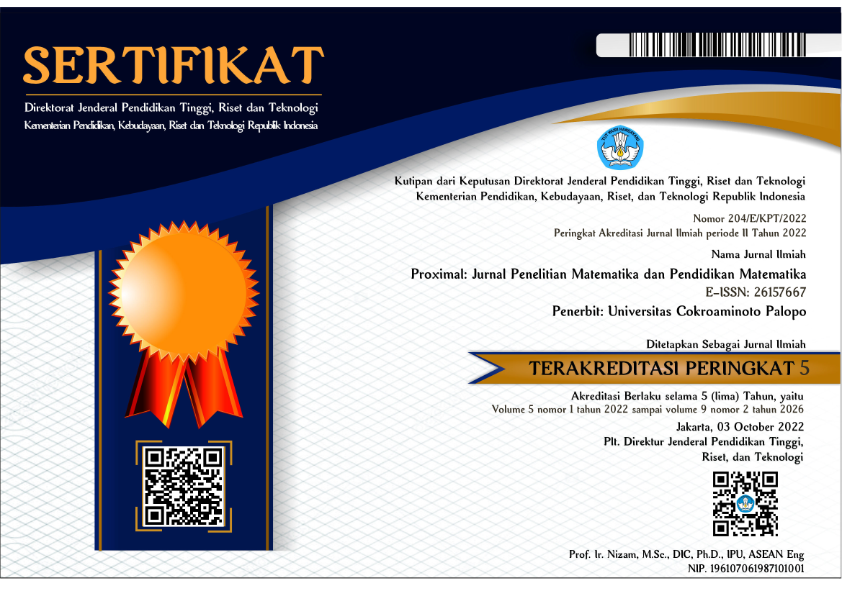Persepsi Kesiapan, Sikap dan Motivasi Belajar Mandiri terhadap Pembelajaran Matematika secara Kolaboratif Berbasis Online
DOI:
https://doi.org/10.30605/proximal.v7i1.3316Keywords:
Readiness, ,Attitude, Motivation, Mathematics Learning Collaborative Online BasedAbstract
The research aims to describe the readiness, attitude and motivation of self-learning towards collaborative online based mathematics learning during the covid-19 pandemic. The researcher applies a quantitative descriptive methods in this study. Data collection has been done by giving three kinds of questionnaires including readiness, attitude and self learning motivation during covid-19 pandemic, and has distributed to 80 students in 3 Senior High School and 1 Vacational High School at Nuha district. The result of this research shows that the students are ready for Mathematics learning collaborative online based during covid-19 pandemic. That is supported by their ability to operate the computer and the usage of internet as well as their online learning experience they have been through for 2 years in online learning situation. Students' motivation towards learning mathematics through the implementation of online based collaborative learning is inconsistent even though it is in moderate level of motivation. Some students prefer the face to face learning process to online learning process and think that the previous learning will provide better learning outcomes. This is a challenge for teachers to prepare for the new normal phase with more interesting teaching material, strategies and learning methods by the development of digitalization of learning
Downloads
References
Azwar, S. (2013). Sikap Manusia: Teori dan Pengukurannya. Yogyakarta: Pustaka Pelajar.
Breckler, S. J. (1984). Empirical validation of affect, behavior and cognition as distinct components of attitude. Journal of Personality and Social Psychology, 47 (6). 1191-1205. American Psychological Association, Washington D. C.
Burns, R. B. (1997). Introduction to Research Methods (3rd ed.). Longman, Melbourne
Dabbagh, N., & Bannan Ritland, B. (2005). Online Learning: Concept, Strategies, and Application. New Jersey: Pearson Education, Inc.
Djamarah Syaiful Bahri. 2002. Strategi Belajar Mengajar. Jakarta : Rineka Cipta
Hung, M. L., Chou, C., Chen, C. H., & Own, Z. Y. (2010). Learner readiness for online learning: Scale development and student perceptions. Computers & Education, 55(3), 1080-1090. https://doi.org/ 10.1016/j.compedu.2010.05.004
Hung, M., Chou, C., Chen, C., & Own, Z. (2010). Computers & Education Learner Readiness for Online Learning: Scale Development and Student Perceptions. Computers & Education, 55(3), 1080–1090.
Jefiza, (2012). Student’s Motivation and Attitudes toward Learning English Course in Bandung. Indonesia University of Education.
Jones, T., and Clarke, V. A. (1994). A computer attitude scale for secondary students. Computers in Education, 22(4), 315-318.
Joppe, M. (2000). The Research Process. Retrieved February 25, 1998, from http://www.ryerson.ca/~mjoppe/rp.htm
Kemendikbud. (2020). Surat Edaran Tahun 2020 Nomor 36962/MPK.A/HK/2020 tentang Pembelajaran secara Daring dan Bekerja dari Rumah dalam Rangka Pencegahan Penyebaran Corona Virus Disease (COVID- 19), Kementrian Pendidikan dan Kebudayaan Republic Indonesia.
McVay, M. (2000). Developing a web-based distance student orientation to enhance student success in an online bachelor’s degree completion program. Unpublished practicum report presented to the Ed.D. Program. Florida: Nova Southeastern University.
McVay, M. (2001). How to be a successful distance learning student: Learning on the on the Internet. New York: Prentice Hall.
Oemar Hamalik. (2003). Perencanaan Pengajaran Berdasarkan Pendekatan Sistem. Jakarta: Bumi Aksara, h. 41.
Sato, M. (2007). Tantangan yang Harus Dihadapi Sekolah, makalah dalam Bacaan Rujukan untuk Lesson Study – Berdasarkan Pengalaman Jepang dan IMSTEP. Jakarta: Sisttems.
Siagian, Holong simurung, dkk. (2021). Analisis Kesiapan Belajar Daring Siswa Kelas Vii Pada Masa Pandemi Covid-19 Di Desa Simpang Tiga Laebingke Kecamatan Sirandorung. Jurnal MathEdu (Mathematic Education Journal) http://journal.ipts.ac.id/index.php/MathEdu
Vol. 4 No. 2 Juli 2021
Slameto. 2010. Belajar dan Faktor-Faktor yang Mempengaruhi. h. 114.Jakarta: Rineka Cipta.h. 114.
Soemanto, Wasty. (2012). Psikologi Pendidikan. Jakarta: Rineka Cipta, h. 119
Sofyana, Abdul. (2019). Pembelajaran Daring Kombinasi Berbasis Whatsapp Pada Kelas Karyawan Prodi Teknik Informatika Universitas PGRI Madiun. Jurnal Nasional Pendidikan Teknik Informatika. Volume 8 Nomor 1, Halm. 81-86.
Staples, M. (2007). Supporting Whole-Class Collaborative Inquiry in a Secondary Mathematics Classroom. Cognition & Instruction.
Sudjana. 2001. Metode & Teknik Pembelajaran Partisipatif. Bandung: Falah Production.
Sugiyono. 2011. Metode Penelitian Pendidikan. Bandung. Abeta. Hal 137
Waryanto, Nur Hadi. (2006). Online Learning Sebagai Salah Satu Inovasi Pembelajaran. Pythagoras Jurnal Matematika dan Pendidikan Matematika, 2 (Des), 10-23.
Widjajanti, Djamilah B. (2010). Mengembangkan Kemampuan Komunikasi Matematis Mahasiswa Calon Guru Matematika melalui Strategi Perkuliahan Kolaboratif Berbasis Masalah. Makalah Seminar Nasional UNY, April 2010. Yogyakarta.
Downloads
Published
How to Cite
Issue
Section
License
In submitting the manuscript to the journal, the authors certify that:
- They are authorized by their co-authors to enter into these arrangements.
- The work described has not been formally published before, except in the form of an abstract or as part of a published lecture, review, thesis, or overlay journal.
- That it is not under consideration for publication elsewhere,
- That its publication has been approved by all the author(s) and by the responsible authorities – tacitly or explicitly – of the institutes where the work has been carried out.
- They secure the right to reproduce any material that has already been published or copyrighted elsewhere.
- They agree to the following license and copyright agreement.
License and Copyright Agreement
Authors who publish with this journal agree to the following terms:
- Authors retain copyright and grant the journal right of first publication with the work simultaneously licensed under Creative Commons Attribution License (CC BY 4.0) that allows others to share the work with an acknowledgment of the work's authorship and initial publication in this journal.
- Authors are able to enter into separate, additional contractual arrangements for the non-exclusive distribution of the journal's published version of the work (e.g., post it to an institutional repository or publish it in a book), with an acknowledgment of its initial publication in this journal.
- Authors are permitted and encouraged to post their work online (e.g., in institutional repositories or on their website) prior to and during the submission process, as it can lead to productive exchanges, as well as earlier and greater citation of published work.















